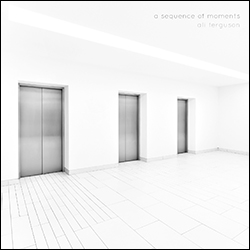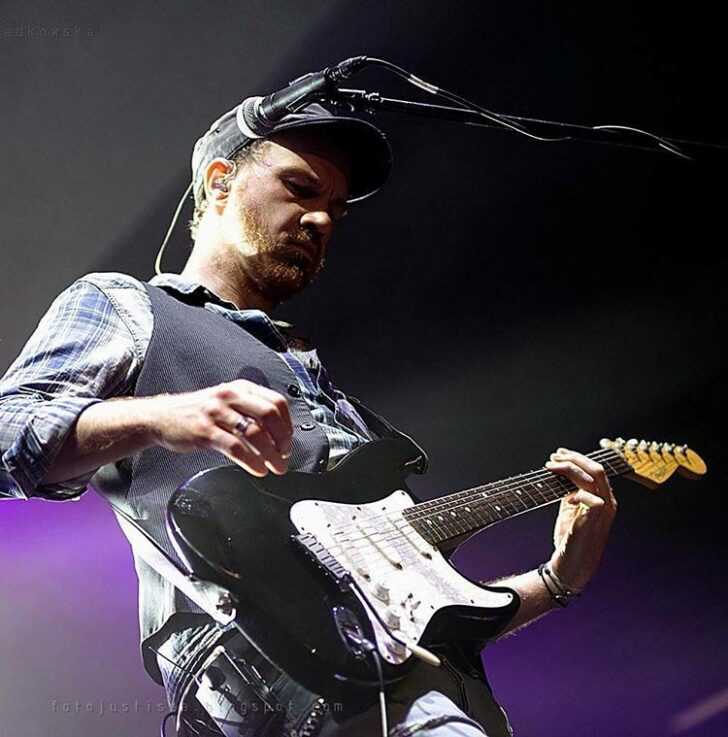- Article
- Read in 6 minutes
Ali Ferguson – A Sequence Of Moments – Album review (2016)
In early 2016, Aili Ferguson released his second solo album – aftr the acclaimed The Windmills And The Stars in 2011. Christian took a closer look …
Windmills and stars were the subjects of his first solo album – an ode to light and darkness in a way. The reception of Ali Ferguson’s debut album as a solo artist wasn’t just good among fans of Ray Wilson, it actually was a really good album in and of itself. It was hard to deny influences from bands such as Radiohead or Pink Floyd, but of course there wasn’t any need to. Apart from more celestial songs he also managed to convince listeners with catchy tunes like Coincidence Is No Accident. You can find a detailed review of his debut album The Windmills And The Stars here.
It seems like Ali Ferguson has been given a certain kind of “label” since then. His collaboration with Ray Wilson had already resulted in some great songs including Frequency from the album Propaganda Man. With his solo album, however, he was able to fully realise his potential and show what happens when he’s given free rein..

He needed quite a bit of time to get the work on his second album going. For a long while his second album was more of a side project he only worked on when he could find the time and the collaborating artists were available as he had to focus on his other work. Ali also decided to cover some of the production cost through crowdfunding. Thus, the album’s final mix was completed late 2015 and the CDs were pressed in January 2016. He titled his second album A Sequence Of Moments.
Apart from Ali (guitars, vocals, keyboards, programming) the following artists were involved in its creation:
Chris Agnew – Bass (tracks 1,3,6,7)
Lawrie Macmillan – Bass (tracks 2,5,8)
Liam Saunders – Keys
Kim Shepherd – Backing Vocals
Duncan Ferguson – Strings
Kerstie Barr – Spoken Word
Graheme Hughes was responsible for the album’s final mix.
Ali Ferguson is still keeping his second album rather anonymous: there is no photo of him anywhere; the artwork relies on more subdued motifs. The songs get a bit of additional depth with the included lyrics and matching quotes from famous personalities. While the cover and back cover show a rather cold and sterile-looking elevator area, the other motifs in the booklet are dominated by mist or clouds, creating the visual impression of a damp and cold environment. Interestingly, the music has a kind of warmth that is in direct contrast to these visuals.

The album starts off with rather monotone keyboards, ambient sounds and voices – the latter mostly in German. It’s quite a while before the guitar comes in, immediately giving the feeling that there’s a big fan of Pink Floyd at work here. Towards the middle, the song picks up the pace and intensifies a little. Why Are We Whispering is a nice ten minute intro. It’s easy to relate to the musician relaxing in front of a hotel TV, while skipping through the channels after an exciting day.
Right after that, Out Of The Dark, with its distorted, celestial vocals follows a very nice song structure. It has a few influences form world music, some Irish elements and a few characteristics from the easy listening area. Interestingly, Out Of The Dark also deviates from its initial atmosphere and becomes more direct. The song is rounded off with guitar solos and a nice drumbeat.
At far over eight minutes, the eponymous A Sequence Of Moments is rather long, but it also has some catchy tunes to offer. Again, it starts off more slowly with ambient sounds and voices. The song’s structure only begins to manifest after two and a half minutes. Perhaps a more direct mix of his vocals with less distortion/reverb would have been the better choice here, offering a stronger contrast to the first two songs. The acoustic guitar solo towards the end makes up for that though. The Realisation is reminiscent at first of a song from Mike Oldfield’s Songs Of Distant Earth before the guitar with its David Gilmour influences joins in again. The central part of the instrumental piece is Ali’s guitar play; there aren’t too many variations. It’s more of an interlude prefacing Is This Enlightenment?, which also clearly has the same kind of symbiosis of electronic, playful elements similar to Mike Oldfield’s later works, as well as elements from Floyd, Radiohead and yes, even Steven Wilson. The song wouldn’t have been out of place on Hand. Cannot. Erase – it’s a great piece of music.
There are a few moments, when not only his guitar sounds similar to David Gilmour, but also his vocals, one example being the beginning of Into Falling Stars. This particular song is also closest to a pop song and could be this album’s Coincidence Is No Accident, maybe even its central piece.
The nine minutes of All In The Winds stick out a little, even though the first five verses are very similar in structure to many other songs on the album. After that we get a real beat usually reserved to discos or radio music. A subtle bit of spoken vocals and more electronic sounds on top and you quickly catch yourself tapping along to the music. It definitely has the desired effect. You even get the feeling, that this moment of Hello! Wake Up! is intentional. It’s a great preparation for the album’s finale in any case.
The Lost Satellites is very accessible and relatively easy to listen to even though the song is also almost nine minutes long. The finale Above This Fractured Earth starts like the album’s first song – apparently Ali intends to frame the whole album and present it as coming full-circle. However, the song also includes some vocal parts and ends with a fadeout of the ambient sounds and voices present throughout the album.

Nine songs and 72 minutes of music. You should take a lot of time for Ali’s second album. Even though you can listen to it casually, it then becomes hard to tell one song from the other and they become less memorable. This can also be seen as the main point of criticism: Seven songs at 55 minutes total would have probably been enough; some of the songs sound too similar. This is exacerbated by the fact that Ali’s vocals are practically always set up the same way for every song they’re featured in. It does have the advantage of giving the whole album a distinct atmosphere and making it sound seamless, but it also means that it lacks some contrast and variety. The absence of real drums is also a pity of course, but it should be noted under what circumstances Ali recorded the album.
Fans of celestial music in the vein of Pink Floyd, Mike Oldfield, FLY or Steven Wilson will get their money’s worth. Some of the songs wouldn’t have been out of place on The Endless River(Pink Floyd), Hand. Cannot. Erase (Steven Wilson) or The Songs Of Distant Earth (Mike Oldfield). A Sequence of Moments weaves many moments together into a seamless whole, it’s an album that invites you to dream and relate and is definitely a unique brand in ambient/prog rock music. It represents another step for Ali to establish himself as a solo artist and a further shift of his work towards prog rock compared to his previous album. It’s less to the point, but broader and more spacious. It lacks a few surprises and maybe a bit of courage to do the unexpected, making it feel overly long at times. Still, A Sequence Of Moments is of admirably high quality when it comes to song structure and the realisation of its overall concept. Ali should build on that to make more of a name for himself in future.
You can order A Sequence Of Moments directly from Ali Ferguson’s Bandcamp Site.
Author: Christian Gerhardts
Translation by Robin Morgenstern
Links:
Ali Ferguson on Facebook

